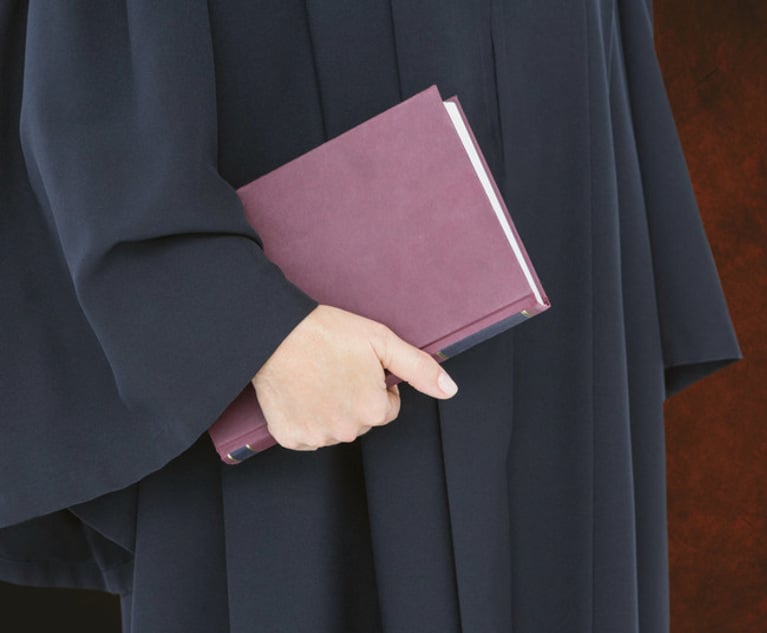Appeals Court Rules Against Immigrants Over In-State Tuition
Immigrants who have been granted temporary status to stay in the U.S. will have to keep paying out-of-state tuition after the Georgia Court of Appeals ruled against them, saying state colleges and universities in Georgia aren't required to let them pay in-state tuition.
October 26, 2017 at 01:45 PM
6 minute read
 Judge Clyde Reese, Georgia Court of Appeals (Photo: John Disney / ALM)
Judge Clyde Reese, Georgia Court of Appeals (Photo: John Disney / ALM)
Immigrants who have been granted temporary status to stay in the U.S. will have to keep paying out-of-state tuition after an appeals court ruled against them, saying state colleges and universities in Georgia aren't required to let them pay in-state tuition.
Georgia's state colleges and universities require verification of “lawful presence” in the U.S. for in-state tuition. The Board of Regents has said students with temporary permission to stay under a 2012 program known as Deferred Action for Childhood Arrivals, or DACA, don't meet that requirement.
A group of young immigrants who meet all the other requirements and who have been granted deferred action status filed a petition in April 2016 in Fulton County Superior Court asking a judge to order the university system to allow them to pay in-state tuition.
Charles Kuck, a lawyer for the young immigrants, had argued that the U.S. Department of Homeland Security has said beneficiaries of that program are considered “lawfully present.”
Lawyers for the university system rejected that argument, saying the statement about lawful presence appeared in an FAQ section of the department's website and not as an official policy or regulation.
Fulton County Superior Court Chief Judge Gail Tusan in January sided with the students and ordered the university system to allow the students to pay in-state tuition if they otherwise qualify. Enforcement of her order was put on hold while the state appealed.
The Georgia Court of Appeals on Tuesday reversed that ruling.
The appeals court opinion said the DACA policy and website FAQ do not constitute an enforceable federal law that designates those immigrants as being “lawfully present.” There is also no indication that state law or the university system's policies require that DACA recipients be granted in-state tuition because they are designated as “lawfully present,” Judge Clyde Reese III wrote.
Kuck said he's disappointed by the appeals court's decision and his clients plan to appeal to the Georgia Supreme Court.
 Judge
Judge
Immigrants who have been granted temporary status to stay in the U.S. will have to keep paying out-of-state tuition after an appeals court ruled against them, saying state colleges and universities in Georgia aren't required to let them pay in-state tuition.
Georgia's state colleges and universities require verification of “lawful presence” in the U.S. for in-state tuition. The Board of Regents has said students with temporary permission to stay under a 2012 program known as Deferred Action for Childhood Arrivals, or DACA, don't meet that requirement.
A group of young immigrants who meet all the other requirements and who have been granted deferred action status filed a petition in April 2016 in Fulton County Superior Court asking a judge to order the university system to allow them to pay in-state tuition.
Charles Kuck, a lawyer for the young immigrants, had argued that the U.S. Department of Homeland Security has said beneficiaries of that program are considered “lawfully present.”
Lawyers for the university system rejected that argument, saying the statement about lawful presence appeared in an FAQ section of the department's website and not as an official policy or regulation.
Fulton County Superior Court Chief Judge Gail Tusan in January sided with the students and ordered the university system to allow the students to pay in-state tuition if they otherwise qualify. Enforcement of her order was put on hold while the state appealed.
The Georgia Court of Appeals on Tuesday reversed that ruling.
The appeals court opinion said the DACA policy and website FAQ do not constitute an enforceable federal law that designates those immigrants as being “lawfully present.” There is also no indication that state law or the university system's policies require that DACA recipients be granted in-state tuition because they are designated as “lawfully present,” Judge
Kuck said he's disappointed by the appeals court's decision and his clients plan to appeal to the Georgia Supreme Court.
This content has been archived. It is available through our partners, LexisNexis® and Bloomberg Law.
To view this content, please continue to their sites.
Not a Lexis Subscriber?
Subscribe Now
Not a Bloomberg Law Subscriber?
Subscribe Now
NOT FOR REPRINT
© 2025 ALM Global, LLC, All Rights Reserved. Request academic re-use from www.copyright.com. All other uses, submit a request to [email protected]. For more information visit Asset & Logo Licensing.
You Might Like
View All

Sanctions Order Over Toyota's Failure to Provide English Translations of Documents Vacated by Appeals Court
4 minute read
Burr & Forman, Smith Gambrell & Russell Promote More to Partner This Year
7 minute readTrending Stories
- 1Decision of the Day: Uber Cannot Be Held Vicariously Liable for Driver's Alleged Negligent Conduct
- 2TikTok Law and TikTok Politics
- 3California Supreme Court Vacates Murder Conviction in Infant Abuse Case
- 4New York’s Proposed Legislation Restraining Transfer of Real Property
- 5Withers Hires Lawyers, Staff From LA Trusts and Estates Boutique
Who Got The Work
Michael G. Bongiorno, Andrew Scott Dulberg and Elizabeth E. Driscoll from Wilmer Cutler Pickering Hale and Dorr have stepped in to represent Symbotic Inc., an A.I.-enabled technology platform that focuses on increasing supply chain efficiency, and other defendants in a pending shareholder derivative lawsuit. The case, filed Oct. 2 in Massachusetts District Court by the Brown Law Firm on behalf of Stephen Austen, accuses certain officers and directors of misleading investors in regard to Symbotic's potential for margin growth by failing to disclose that the company was not equipped to timely deploy its systems or manage expenses through project delays. The case, assigned to U.S. District Judge Nathaniel M. Gorton, is 1:24-cv-12522, Austen v. Cohen et al.
Who Got The Work
Edmund Polubinski and Marie Killmond of Davis Polk & Wardwell have entered appearances for data platform software development company MongoDB and other defendants in a pending shareholder derivative lawsuit. The action, filed Oct. 7 in New York Southern District Court by the Brown Law Firm, accuses the company's directors and/or officers of falsely expressing confidence in the company’s restructuring of its sales incentive plan and downplaying the severity of decreases in its upfront commitments. The case is 1:24-cv-07594, Roy v. Ittycheria et al.
Who Got The Work
Amy O. Bruchs and Kurt F. Ellison of Michael Best & Friedrich have entered appearances for Epic Systems Corp. in a pending employment discrimination lawsuit. The suit was filed Sept. 7 in Wisconsin Western District Court by Levine Eisberner LLC and Siri & Glimstad on behalf of a project manager who claims that he was wrongfully terminated after applying for a religious exemption to the defendant's COVID-19 vaccine mandate. The case, assigned to U.S. Magistrate Judge Anita Marie Boor, is 3:24-cv-00630, Secker, Nathan v. Epic Systems Corporation.
Who Got The Work
David X. Sullivan, Thomas J. Finn and Gregory A. Hall from McCarter & English have entered appearances for Sunrun Installation Services in a pending civil rights lawsuit. The complaint was filed Sept. 4 in Connecticut District Court by attorney Robert M. Berke on behalf of former employee George Edward Steins, who was arrested and charged with employing an unregistered home improvement salesperson. The complaint alleges that had Sunrun informed the Connecticut Department of Consumer Protection that the plaintiff's employment had ended in 2017 and that he no longer held Sunrun's home improvement contractor license, he would not have been hit with charges, which were dismissed in May 2024. The case, assigned to U.S. District Judge Jeffrey A. Meyer, is 3:24-cv-01423, Steins v. Sunrun, Inc. et al.
Who Got The Work
Greenberg Traurig shareholder Joshua L. Raskin has entered an appearance for boohoo.com UK Ltd. in a pending patent infringement lawsuit. The suit, filed Sept. 3 in Texas Eastern District Court by Rozier Hardt McDonough on behalf of Alto Dynamics, asserts five patents related to an online shopping platform. The case, assigned to U.S. District Judge Rodney Gilstrap, is 2:24-cv-00719, Alto Dynamics, LLC v. boohoo.com UK Limited.
Featured Firms
Law Offices of Gary Martin Hays & Associates, P.C.
(470) 294-1674
Law Offices of Mark E. Salomone
(857) 444-6468
Smith & Hassler
(713) 739-1250







